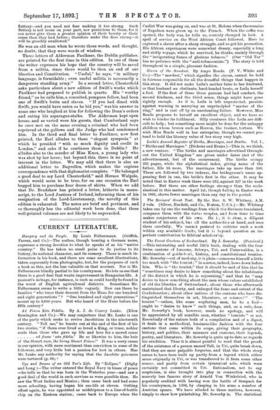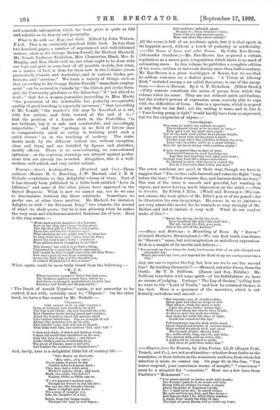The Forest Cantons of Switzerland. By J. Sowerby. (Percival.) —This
interesting and useful little book, dealing with the four Swiss cantons of Lucerne, Schwyz, Uri, and 17nterwalden, is a combination of guide-book, history, and constitutional treatise. Mr. Sowerby—out of modesty, it is plain—concerns himself a little too much with "the tourist ; " in a sense, indeed, bows down before him. Who is "the tourist," that it should be said of him that he "sometimes may desire to know something about the inhabitants of the district in which he is sojourning," and that he "may desire to know something about the men whose valour established of old the liberties of Switzerland ; about those who afterwards maintained that liberty, and enlarged the fame and extent of the Confederation ; about other natives of the cantons who have dis- tinguished themselves in art, literature, or science ?" "The tourist"—unless, like some wayfaring men, he be a fool— ought to "desire to know" such things, and, as a rule, does. Mr. Sowerby's book, however, needs no apology, and will be appreciated by all sensible men, whether " tourists " or not. Essentially of the nature both of a compilation and of a digest, it deals in a methodical, business-like fashion with the four cantons that come within its scope, giving their geography, history, and politics, their manners and customs, their legends, poetry, and literature. Mr. Sowerby is quite up to date as regards his erudition. Thus it is almost painful to read that the proofs of the existence of a person named Tell, in Uri, quite break down, that they are most palpable forgeries, and that the whole story seems to have been built up partly from a legend which either arose originally in Uri, or was transferred to it from some other source, and partly from certain tyrannical acts, which were certainly not committed in ITri. Rationalism, not to say scepticism, is also brought into play in connection with the scarcely less famous story of Arnold Von Winkelried, who is popularly credited with having won the battle of Sempach for his countrymen, in 1386, by clasping in his arms a number of Austrian spears. We have alluded to these matters, however, simply to show how painstaking Mr. Sowerby is. The statistical and scientific information which his book gives is quite as full and reliable as its history and geography.



































 Previous page
Previous page